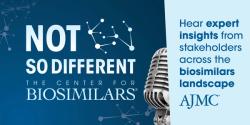© 2026 MJH Life Sciences™ and The Center for Biosimilars - Biosimilars, Health Economics & Insights. All rights reserved.
Cate Lockhart, PharmD, PhD: Challenges With Large-Scale Comparative Effectiveness Research
Cate Lockhart, PharmD, PhD, executive director of the Biologics and Biosimilars Collective Intelligence Consortium (BBCIC), discusses the challenges inherent in conducting large-scale comparative effectiveness research on biologics and biosimilars.
Transcript
So we recently just published a manuscript that we effectively call “the gaps paper.” It's a thought leadership commentary paper to highlight all of our experience that we've had so far as BBCIC. We were looking at what are the strengths and limitations of doing this type of research.
Data-source selection is obviously 1 element in there that can play a role in how successful you are in answering the research questions that you want to answer, and that also plays a role, as I said before, with cohort identification, exposure identification, outcomes identification.
But then there's also other considerations in terms of, within any data system, what can we and can't we answer? So one project that we had done is a mapping from ICD-9 and ICD-10 codes, which is essential if you're using data that's more current or more recent than October of 2015. Considering our first biosimilar in the US was not approved until 2015, you can't really do research with biosimilars if you can't use data more current than then.
So we had a group do mapping for all of the relevant disease states and conditions that BBCIC is currently interested in, which is a much more complex undertaking than it sounds like. But that was a way for us to build up our capabilities and our infrastructure within the constraints that we have with our administrative claims data.
We also were looking at the extent to which products biosimilars says particularly are coded in medical claims from physician offices. Many biologics and biosimilars are our physician-administered medications, so we were looking at to what extent the those were coded with [National Drug Codes, NDC] codes, or product-specific J-codes, because that plays a major role in our ability to identify the products that we're looking at. So that was another way that we could shed light on some opportunities for us to improve our data sources.



